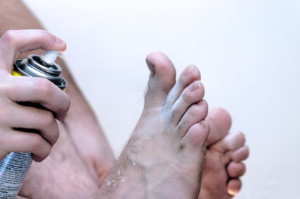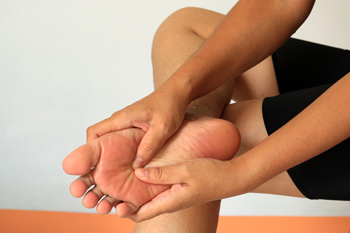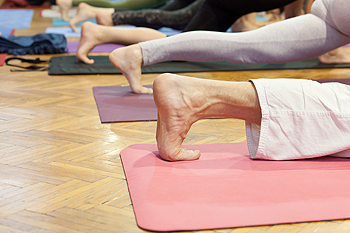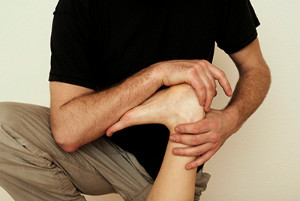Connect With Us
Blog
Items filtered by date: June 2020
Athlete’s Foot May Cause Severe Itching
 The medical condition that is known as athlete’s foot can cause the foot to become itchy and uncomfortable. It typically affects the skin between the toes and the bottom of the feet. It is caused by a fungus that lives and thrives in moist and warm environments. These can include wearing socks and shoes that are wet, public swimming pools, and communal shower rooms. Patients may find relief when an antifungal powder is used, and this may help to relieve a portion of the itching and swelling that may accompany athlete’s foot. It is beneficial to wear appropriate shoes while in these areas, in addition to alternating shoes which can help them to dry out. If you have symptoms of athletes’ foot, it is suggested that you seek the counsel of a podiatrist, who can offer the best treatment options for you, which may include prescribed medication.
The medical condition that is known as athlete’s foot can cause the foot to become itchy and uncomfortable. It typically affects the skin between the toes and the bottom of the feet. It is caused by a fungus that lives and thrives in moist and warm environments. These can include wearing socks and shoes that are wet, public swimming pools, and communal shower rooms. Patients may find relief when an antifungal powder is used, and this may help to relieve a portion of the itching and swelling that may accompany athlete’s foot. It is beneficial to wear appropriate shoes while in these areas, in addition to alternating shoes which can help them to dry out. If you have symptoms of athletes’ foot, it is suggested that you seek the counsel of a podiatrist, who can offer the best treatment options for you, which may include prescribed medication.
Athlete’s foot is an inconvenient condition that can be easily reduced with the proper treatment. If you have any concerns about your feet and ankles, contact Imaze Marian Davis, DPM from Marian Davis, DPM, PA. Our doctors will treat your foot and ankle needs.
Athlete’s Foot: The Sole Story
Athlete's foot, also known as tinea pedis, can be an extremely contagious foot infection. It is commonly contracted in public changing areas and bathrooms, dormitory style living quarters, around locker rooms and public swimming pools, or anywhere your feet often come into contact with other people.
Solutions to Combat Athlete’s Foot
- Hydrate your feet by using lotion
- Exfoliate
- Buff off nails
- Use of anti-fungal products
- Examine your feet and visit your doctor if any suspicious blisters or cuts develop
Athlete’s foot can cause many irritating symptoms such as dry and flaking skin, itching, and redness. Some more severe symptoms can include bleeding and cracked skin, intense itching and burning, and even pain when walking. In the worst cases, Athlete’s foot can cause blistering as well. Speak to your podiatrist for a better understanding of the different causes of Athlete’s foot, as well as help in determining which treatment options are best for you.
If you have any questions please feel free to contact our office located in Miami, FL . We offer the newest diagnostic and treatment technologies for all your foot and ankle needs.
Daily Foot Care for Diabetic Patients
 Many patients who are diabetic understand the importance of maintaining proper foot care. Diabetes can cause neuropathy, which can lead to the inability to feel cuts and bruises on the feet. It is beneficial to perform daily foot checks that include noticing any abnormalities of the feet, ensuring the feet stay clean, and trimming the toenails correctly. Research has indicated that it can be wise to avoid walking barefoot, in addition to wearing shoes that are specifically made for diabetic patients. When the legs are refrained from being crossed for long periods of time, blood flow may be increased. It is beneficial to practice simple foot stretches during the course of the day, which can consist of flexing the ankles, and wiggling the toes. It is strongly suggested that people who have diabetes are under the care of a podiatrist who can effectively manage this condition.
Many patients who are diabetic understand the importance of maintaining proper foot care. Diabetes can cause neuropathy, which can lead to the inability to feel cuts and bruises on the feet. It is beneficial to perform daily foot checks that include noticing any abnormalities of the feet, ensuring the feet stay clean, and trimming the toenails correctly. Research has indicated that it can be wise to avoid walking barefoot, in addition to wearing shoes that are specifically made for diabetic patients. When the legs are refrained from being crossed for long periods of time, blood flow may be increased. It is beneficial to practice simple foot stretches during the course of the day, which can consist of flexing the ankles, and wiggling the toes. It is strongly suggested that people who have diabetes are under the care of a podiatrist who can effectively manage this condition.
Diabetic foot care is important in preventing foot ailments such as ulcers. If you are suffering from diabetes or have any other concerns about your feet, contact Imaze Marian Davis, DPM from Marian Davis, DPM, PA. Our doctors can provide the care you need to keep you pain-free and on your feet.
Diabetic Foot Care
Diabetes affects millions of people every year. The condition can damage blood vessels in many parts of the body, especially the feet. Because of this, taking care of your feet is essential if you have diabetes, and having a podiatrist help monitor your foot health is highly recommended.
The Importance of Caring for Your Feet
- Routinely inspect your feet for bruises or sores.
- Wear socks that fit your feet comfortably.
- Wear comfortable shoes that provide adequate support.
Patients with diabetes should have their doctor monitor their blood levels, as blood sugar levels play such a huge role in diabetic care. Monitoring these levels on a regular basis is highly advised.
It is always best to inform your healthcare professional of any concerns you may have regarding your feet, especially for diabetic patients. Early treatment and routine foot examinations are keys to maintaining proper health, especially because severe complications can arise if proper treatment is not applied.
If you have any questions please feel free to contact our office located in Miami, FL . We offer the newest diagnostic and treatment technologies for all your foot and ankle needs.
What Does Morton’s Neuroma Feel Like?
 Morton’s neuroma is a foot condition caused by an enlarged nerve or thickening of tissue surrounding a nerve, most commonly between the third and fourth toes. Those who have experienced this condition often relay feeling pain in the ball of their foot. Common symptoms that can accompany Morton’s neuroma include burning in the ball of your foot that can also be reached in the toes, a numbing or tingling sensation felt in the toes, and feeling as if a pebble is stuck inside your shoe. To help relieve the discomfort of Morton’s neuroma, patients have found custom orthotics and acupuncture to be beneficial. In order to properly diagnose this condition and to receive prompt treatment, it’s suggested that you speak with a podiatrist for professional care and attention.
Morton’s neuroma is a foot condition caused by an enlarged nerve or thickening of tissue surrounding a nerve, most commonly between the third and fourth toes. Those who have experienced this condition often relay feeling pain in the ball of their foot. Common symptoms that can accompany Morton’s neuroma include burning in the ball of your foot that can also be reached in the toes, a numbing or tingling sensation felt in the toes, and feeling as if a pebble is stuck inside your shoe. To help relieve the discomfort of Morton’s neuroma, patients have found custom orthotics and acupuncture to be beneficial. In order to properly diagnose this condition and to receive prompt treatment, it’s suggested that you speak with a podiatrist for professional care and attention.
Morton’s neuroma is a very uncomfortable condition to live with. If you think you have Morton’s neuroma, contact Imaze Marian Davis, DPM of Marian Davis, DPM, PA. Our doctors will attend to all of your foot care needs and answer any of your related questions.
Morton’s Neuroma
Morton's neuroma is a painful foot condition that commonly affects the areas between the second and third or third and fourth toe, although other areas of the foot are also susceptible. Morton’s neuroma is caused by an inflamed nerve in the foot that is being squeezed and aggravated by surrounding bones.
What Increases the Chances of Having Morton’s Neuroma?
- Ill-fitting high heels or shoes that add pressure to the toe or foot
- Jogging, running or any sport that involves constant impact to the foot
- Flat feet, bunions, and any other foot deformities
Morton’s neuroma is a very treatable condition. Orthotics and shoe inserts can often be used to alleviate the pain on the forefront of the feet. In more severe cases, corticosteroids can also be prescribed. In order to figure out the best treatment for your neuroma, it’s recommended to seek the care of a podiatrist who can diagnose your condition and provide different treatment options.
If you have any questions, please feel free to contact our office located in Miami, FL . We offer the newest diagnostic and treatment technologies for all your foot care needs.
Common Issues With the Achilles Tendon
 The Achilles tendon is located at the back of the ankle and connects the heel to the calf muscles. This tendon can be stressed throughout the day and is an important part of being able to complete tasks such as jumping, running, and walking. Common injuries that can occur with the Achilles tendon include tendonitis, partial tears, and ruptures which may require medical attention. Some causes of these injuries may include starting or intensifying a sport, having tight calf muscles, and bone spurs. Due to the risks involved, and the function of the Achilles tendon, please consult with a podiatrist if you are experiencing pain or stiffness in the calf muscles in order to prevent an injury.
The Achilles tendon is located at the back of the ankle and connects the heel to the calf muscles. This tendon can be stressed throughout the day and is an important part of being able to complete tasks such as jumping, running, and walking. Common injuries that can occur with the Achilles tendon include tendonitis, partial tears, and ruptures which may require medical attention. Some causes of these injuries may include starting or intensifying a sport, having tight calf muscles, and bone spurs. Due to the risks involved, and the function of the Achilles tendon, please consult with a podiatrist if you are experiencing pain or stiffness in the calf muscles in order to prevent an injury.
Achilles tendon injuries need immediate attention to avoid future complications. If you have any concerns, contact Imaze Marian Davis, DPM of Marian Davis, DPM, PA. Our doctors can provide the care you need to keep you pain-free and on your feet.
What Is the Achilles Tendon?
The Achilles tendon is a tendon that connects the lower leg muscles and calf to the heel of the foot. It is the strongest tendon in the human body and is essential for making movement possible. Because this tendon is such an integral part of the body, any injuries to it can create immense difficulties and should immediately be presented to a doctor.
What Are the Symptoms of an Achilles Tendon Injury?
There are various types of injuries that can affect the Achilles tendon. The two most common injuries are Achilles tendinitis and ruptures of the tendon.
Achilles Tendinitis Symptoms
- Inflammation
- Dull to severe pain
- Increased blood flow to the tendon
- Thickening of the tendon
Rupture Symptoms
- Extreme pain and swelling in the foot
- Total immobility
Treatment and Prevention
Achilles tendon injuries are diagnosed by a thorough physical evaluation, which can include an MRI. Treatment involves rest, physical therapy, and in some cases, surgery. However, various preventative measures can be taken to avoid these injuries, such as:
- Thorough stretching of the tendon before and after exercise
- Strengthening exercises like calf raises, squats, leg curls, leg extensions, leg raises, lunges, and leg presses
If you have any questions please feel free to contact our office located in Miami, FL . We offer the newest diagnostic tools and technology to treat your foot and ankle needs.
Simple Stretches That Can Help Your Feet
 People who regularly stretch their feet are often aware of the benefits that can come from frequently practicing foot stretches. An effective way to stretch the Achilles tendon is done by standing on a step, and gently lowering one foot at a time. The big toe can be stretched by grasping the heel while sitting down, and slowly bending the big toe toward you. Additionally, this is helpful in stretching the sole of the foot. The toes can become stronger when a towel curl stretch is performed. This is practiced by placing your foot on a towel, and gently grabbing it with your toes. For more information about the benefits of stretching the feet, please schedule an appointment with a podiatrist.
People who regularly stretch their feet are often aware of the benefits that can come from frequently practicing foot stretches. An effective way to stretch the Achilles tendon is done by standing on a step, and gently lowering one foot at a time. The big toe can be stretched by grasping the heel while sitting down, and slowly bending the big toe toward you. Additionally, this is helpful in stretching the sole of the foot. The toes can become stronger when a towel curl stretch is performed. This is practiced by placing your foot on a towel, and gently grabbing it with your toes. For more information about the benefits of stretching the feet, please schedule an appointment with a podiatrist.
Why Stretching Is Important for Your Feet
Stretching the feet is a great way to prevent injuries. If you have any concerns with your feet consult with Imaze Marian Davis, DPM from Marian Davis, DPM, PA. Our doctors will assess your condition and provide you with quality foot and ankle treatment.
Stretching the Feet
Stretching the muscles in the foot is an important part in any physical activity. Feet that are tight can lead to less flexibility and make you more prone to injury. One of the most common forms of foot pain, plantar fasciitis, can be stretched out to help ease the pain. Stretching can not only ease pain from plantar fasciitis but also prevent it as well. However, it is important to see a podiatrist first to determine if stretching is right for you. Podiatrists can also recommend other ways to stretch your feet. Once you know whether stretching is right for you, here are some excellent stretches you can do.
- Using a foam roller or any cylindrical object (a water bottle or soda can will do), roll the object under your foot back and forth. You should also exert pressure on the object. Be sure to do this to both feet for a minute. Do this exercise three times each.
- Similar to the previous exercise, take a ball, such as a tennis ball, and roll it under your foot while seated and exert pressure on it.
- Grab a resistance band or towel and take a seat. If you are using a towel, fold it length wise. Next put either one between the ball of your foot and heel and pull with both hands on each side towards you. Hold this for 15 seconds and then switch feet. Do this three times for each foot.
- Finally hold your big toe while crossing one leg over the other. Pull the toe towards you and hold for 15 seconds. Once again do this three times per foot.
It is best to go easy when first stretching your foot and work your way up. If your foot starts hurting, stop exercising to ice and rest the foot. It is advised that you then see a podiatrist for help.
If you have any questions, please feel free to contact our office located in Miami, FL . We offer the newest diagnostic and treatment technologies for all your foot care needs.


